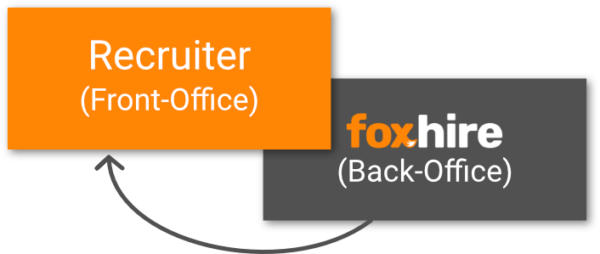

If you’re considering an employer of record vs staffing agency, the choice comes down to one question: Do you need help finding talent, or do you already have talent and need help employing them legally? Two common solutions that often come up are an Employer of Record (EOR) and a Staffing Agency. While both serve the purpose of connecting businesses with workers, there are significant differences between the two. Understanding these distinctions is crucial for organizations looking to make informed decisions about their workforce strategy. In this blog post, we'll delve into the differences between an Employer of Record and a Staffing Company to help you determine which option aligns best with your company's needs.
EOR vs Staffing Agency:
The Core Difference
The difference between an Employer of Record (EOR) and a staffing agency is straightforward. Staffing agencies exist to source and place talent. Their primary role is to identify, vet, and match candidates with companies that need workers. Employers of Record, on the other hand, do not recruit at all. Instead, they step in once a candidate has been identified, taking on the role of legal employer.
An EOR handles payroll, taxes, benefits, and compliance responsibilities for the worker. A staffing agency delivers the candidate. An EOR makes it legal and easy for you to employ that candidate.
What Does an Employer of Record Do?
An Employer of Record acts as the official employer for contract or contingent workers. Rather than leaving businesses to navigate complicated state and federal laws, the EOR assumes responsibility. An Employer of Record acts as the official employer for contract or contingent workers. The EOR manages:
- Payroll and tax withholdings
- Workers’ compensation and unemployment insurance
- Benefits such as health, dental, vision, and retirement plans
- Compliance with federal and state labor laws (including ACA and IRS rules)
- Onboarding and offboarding (I-9, E-Verify, background checks)
What Does a Staffing Agency Do?
A staffing agency, sometimes called a recruiting firm, specializes in sourcing candidates for employers. They:
- Advertise jobs and attract applicants
- Screen, interview, and match candidates to client roles
- Place workers in temporary, contract-to-hire, or permanent jobs
- Charge clients fees (often 20–30% of first-year salary for direct hires, or markup rates for temps)
Staffing agencies are best when a company needs help finding qualified talent, especially in industries with high turnover or specialized skill gaps. In contrast to an EOR, the staffing agency’s responsibility mostly ends with sourcing and matching. They are not typically designed to manage payroll, taxes, or benefits beyond the scope of temporary employment arrangements.
Industry Use Cases
Healthcare
In healthcare, compliance is critical. Hospitals and clinics may rely on staffing agencies to recruit nurses or medical assistants, but employing them requires proper credentialing, workers’ comp coverage, and ACA-compliant benefits. An EOR ensures those rules are followed while reducing the risk of costly penalties.
Education
School districts often need substitutes or paraprofessionals across multiple states. While staffing agencies can help source the teachers, they do not always have the infrastructure to handle payroll and compliance. An EOR bridges that gap, making it easier for districts to employ workers legally and quickly.
IT and Clerical
Technology and clerical work often involve remote contractors. A recruiter or in-house HR team might already have candidates in mind but may not be able to employ them in multiple states without creating new legal entities. An EOR allows these companies to scale quickly without extra setup.
Remote and Distributed Teams
The rise of remote work means companies are hiring across state lines more than ever. In these cases, a staffing agency isn’t necessary because talent is already identified. The bigger issue is legal employment, which is where an EOR becomes the solution.
Buyer Scenarios: Who Uses What?
Independent recruiters are one of the most common buyers of EOR services. When a recruiter wins a contract staffing opportunity, they often do not want to manage payroll funding or compliance risk. An EOR becomes their silent partner, letting them focus on sourcing and sales.
HR leaders also frequently turn to EORs. For example, if an HR manager needs to onboard remote contractors in several states, partnering with an EOR avoids setting up entities and ensures payroll and benefits are handled correctly.
Staffing agencies themselves sometimes use both models. They may continue to recruit candidates for their clients, but outsource the employer role to an EOR. This keeps their back office lean while still giving clients nationwide reach.
How do Staffing Agencies and EORs work together?
Interestingly enough, any staffing agency can operate as the “employer of record” for the temporary staff that they place, if they have the right infrastructure. This just means they operate as the legal employer for staff they find and place at client organizations. However, many staffing firms lack the infrastructure, expertise, or desire to be the EOR for their staff. This might be the case due to lack of capital, or a belief that the risk and time of being the EOR is not the best decision for their business. So what do staffing agencies do if they cannot be the EOR?

Many staffing agencies decide to partner with an EOR platform like FoxHire, which operates as the EOR and outsourced back office on their behalf. This allows recruiting and staffing agencies to operate as the front office, spending all their time finding candidates and selling new clients. EOR platforms offer a number of different solutions in order to take the burden and work of being the EOR for contracted staff off the plate of the staffing agency.
Compliance and Risk: The EOR Advantage
Compliance is where the differences between EORs and staffing agencies are most apparent.
Worker misclassification is one of the largest risks employers face. Misclassifying an employee as a contractor can result in IRS penalties, lawsuits, and back taxes. By serving as the employer of record, an EOR assumes that liability and ensures the worker is classified correctly.
Co-employment is another issue. Staffing agencies can create risk when workers are employed by both the agency and the end client. An EOR eliminates this confusion by serving as the sole employer, shielding both the recruiter and the client from legal exposure.
Payroll compliance is another area where EORs shine. Each state has different rules for unemployment insurance, workers’ comp, and paid leave. An EOR makes sure that employees are paid correctly and in line with every jurisdiction’s regulations.
Finally, benefits compliance under laws like the Affordable Care Act can become complex as headcounts grow. EORs handle benefit administration so that companies remain compliant while still offering attractive options to workers.
When to Use an Employer of Record vs Staffing Agency
An EOR is the right choice when you already have talent identified and need a legal structure to employ them. They are especially useful for multi-state hiring, risk management, and situations where HR or recruiters want to focus on sourcing while outsourcing payroll and compliance.
A staffing agency is the right choice when you do not have talent lined up and need support with recruiting. They are best suited for roles that are difficult to fill or for employers that prefer to outsource the sourcing process entirely.
Why Many Businesses Use Both
Many organizations find that the best solution is to combine the two. A staffing agency may source and recruit the candidate, while the EOR becomes the legal employer. This partnership gives companies access to talent and the assurance that workers are employed compliantly.
Why Choose FoxHire as Your EOR
FoxHire is a U.S.-focused Employer of Record that supports recruiters, staffing agencies, HR teams, and contingent workforce managers. Unlike staffing agencies, FoxHire does not source talent. Instead, we work behind the scenes to handle employment, compliance, payroll, and benefits for contract workers in all 50 states.
FoxHire Differentiators:
- Flat, transparent pricing (no hidden fees)
- Compliance-first approach across all states
- Dedicated support and fast onboarding
- Works invisibly so you keep client control
Final Thoughts
When comparing employer of record vs staffing agency, the decision comes down to your needs. If you need help finding talent, a staffing agency is the right partner. If you already have talent and need a compliant way to employ them, an EOR like FoxHire is the smarter choice.
For many businesses, the best answer is both: staffing agencies to source, and an EOR to employ. That combination delivers speed, flexibility, and peace of mind.
Transform Your Hiring Process Today
Experience seamless hiring with our platform. Get started with a demo or sign up now!

FAQs
Find answers to common questions about our services and the contingent workforce management.
FoxHire is an Employer of Record service that simplifies hiring for contingent workforce managers. We handle payroll, compliance, and onboarding, allowing you to focus on your core business. Our tech-forward platform automates administrative tasks, making workforce management efficient.
Our platform streamlines the hiring process by managing all administrative tasks related to contingent workers. You can easily onboard new hires and ensure compliance with regulations. This allows staffing agencies and HR departments to scale talent effectively.
Healthcare, education, and professional services sectors can greatly benefit from our services. We cater to organizations looking to manage a flexible workforce efficiently. Our solutions are designed to reduce administrative burdens and compliance risks.
Yes, we offer a demo of our platform to showcase its features and benefits. This allows potential users to see how FoxHire can streamline their hiring processes. Schedule your demo today to explore our solutions.
Signing up is easy! Simply visit our website and click on the 'Sign Up' button. Follow the prompts to create your account and start managing your contingent workforce.
Still have questions?
We're here to help you with any inquiries.
